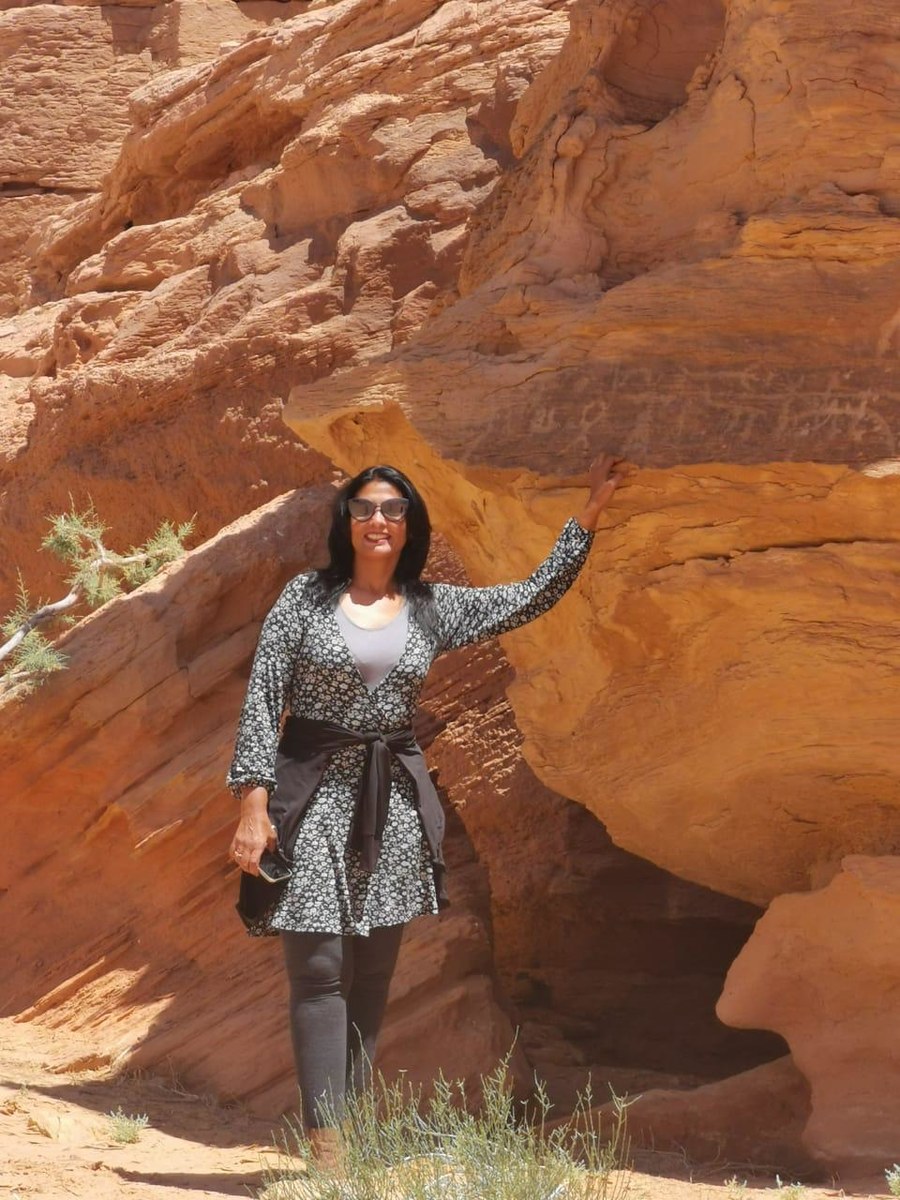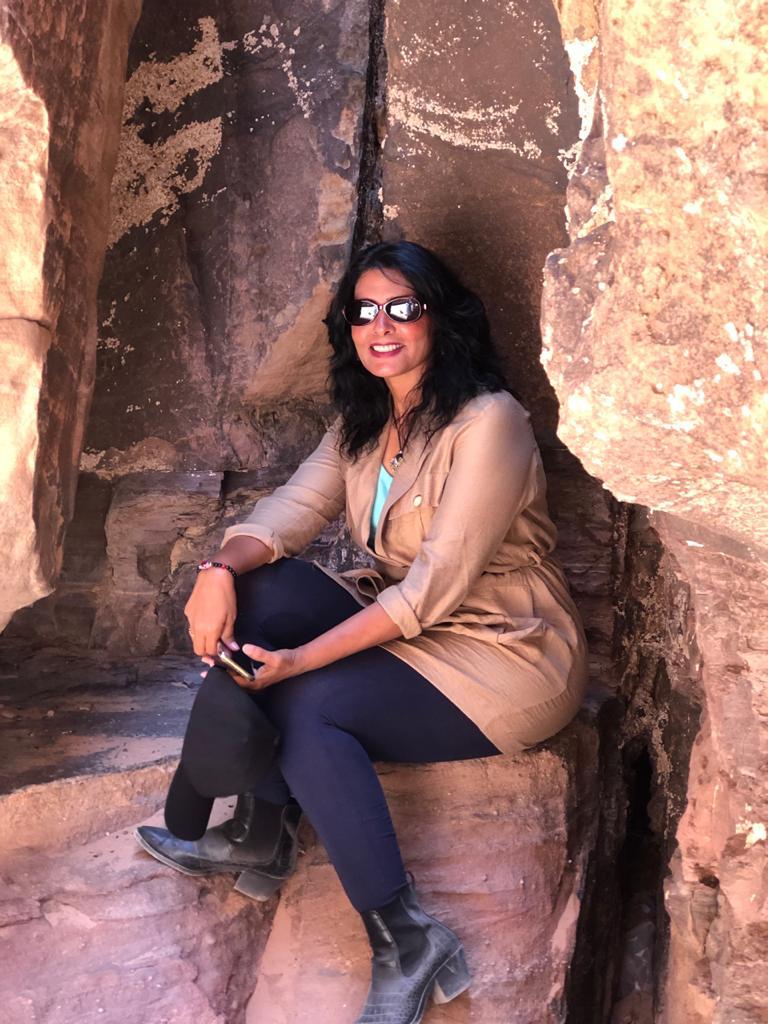Azza Al-Rashidi’s experience of crossing the Empty Quarter in 26 days, which she describes as “a dream come true” serves as an example for others especially women to follow in her footsteps and explore the marvels of the huge desert.
Al-Rashidi, an ambitious Saudi woman with a strong sense of adventure, was the only female in a team of explorers who had joined her from different parts of the world on that memorable trip.
Recalling her 2019 experience, Al-Rashidi said she would love to join an expedition to the Empty Quarter again.
Al-Rub Al-Khali, which is translated as the Empty Quarter, is a desert that occupies most of the southern third of the Arabian Peninsula. It occupies 650,000 square kilometers. It is so big that it includes parts of Saudi Arabia, Oman, the UAE and Yemen.
 Azza Al-Rashidi told Arab News: “The earth is my starting point, and my ambition goes beyond the sky, determination and confidence paddle my boat in the sea of achievement. I was born adventurous; I have always had a strong sense of adventure ever since I could remember. I live for such adventures and experiences.”
Azza Al-Rashidi told Arab News: “The earth is my starting point, and my ambition goes beyond the sky, determination and confidence paddle my boat in the sea of achievement. I was born adventurous; I have always had a strong sense of adventure ever since I could remember. I live for such adventures and experiences.”
She said it was an adventurer’s dream to explore this mysterious sandy expanse, and that her background in social sciences had further sparked her curiosity for the desert.
“Standing in the desert of the Empty Quarter, learning about its natural environment and discovering its ancient geological history represents an urgent desire of every traveler and adventurer. Crossing it was a wish fulfilled and my desire to explore it increased because of my specialization and academic qualifications, social sciences, as this includes history, geography, science and sociology.”
Al-Rashidi traveled with Rakayib Caravan and it was the first trip ordered by Crown Prince Mohammed bin Salman to explore the desert.
“Rakayib’s first trip is a journey that was ordered by the crown prince to discover the Empty Quarter after the journey that took place in the time of King Abdul Aziz in 1932, 88 years ago, by the explorer Harry St. John Bridger Philby, and to learn about its geographical nature,” she explained. “From here, the convoy set out to cross this desert, which makes up a quarter of the Kingdom’s size, with follow-up from the crown prince, the efforts of supervisors from the
Camel Club, the leader of the trip, Maj. Gen. Abdul Aziz Al-Obaida, the organizers and collaborators from the Saudi Geological Survey, and us, 66 adventurers and travelers.”
The trip lasted 26 days. Its starting point was Ubar and the endpoint was Yabreen. Four of the days included training on how to prepare the camel for riding, how to feed it, and follow-ups on providing water for the animal.
The training also included guidance on how to use the sleeping bag, the tent, and even learning words that contributed to interactions with the camel.
 “I arrived from Jeddah by plane to Sharourah, Najran, and from there I and those who were with me took cars that were there to receive us. They transported us to Al-Kharkhir, we reached Ubar, and then we arrived at the camp, which was prepared for a gathering of participants coming from inside the Kingdom and from outside.”
“I arrived from Jeddah by plane to Sharourah, Najran, and from there I and those who were with me took cars that were there to receive us. They transported us to Al-Kharkhir, we reached Ubar, and then we arrived at the camp, which was prepared for a gathering of participants coming from inside the Kingdom and from outside.”
Al-Rashidi said 21 foreign countries were taking part and that participants had something in common: A love for adventure and a passion for achieving that goal.
Participants were divided into seven groups and were given instructions and rules. “We set out for a new life in which we adapted to an environment that differed from what we knew and lived in,” she added.
They had three hiking days and a camping day to rest and recharge, starting the first day by traveling a distance of 15 km by camel. The distance increased from 30 to 45 km in the last two days, ending the journey by crossing 55 km and traveling 8 hours a day.
The journey started at 7:30 a.m. and went on until sunset, and there was an hour’s break at noon.
“During the trip, we arrived from Ubar to areas of mineral-rich water wells in the region, such as Bir Nifa and other stations at which the caravan stopped by following its route until we reached Yabreen. It was breathtaking. Looking at the dimensions of this desert draws me, for its land is the bed of the Tethys Ocean, which has receded during the Earth’s various geological times, leaving evidence of snails, shells, fossils, and millions of insects. The desert that has the four largest sand terrains in the world, whose height reaches between 250 to 300 meters.”
At the end of the trip, the adventurers were received by the deputy governor of the Eastern Province, Prince Ahmed bin Fahd bin Salman.
Al-Rashidi received a certificate of honor, a medal, and a Rakayib Caravan medal.































